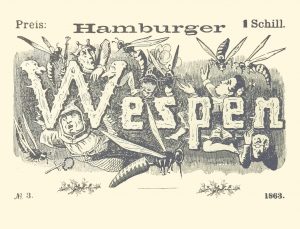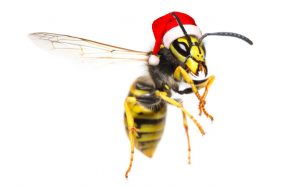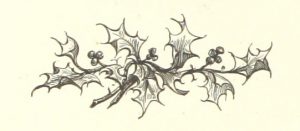Today, dear listener, something for everyone. We are proud to bring you more fascinating folklore of the Christmas Wasp or Wasp King, thanks once more to the industry of Professor Ernst Stellmacher, author of Insekten-Archäologie für Frauen (1873). Professor Stellmacher collected the story below somewhere in Bavaria in the 1860s, and suggested that it echoed a much earlier tale, ‘The Little Tailor and the Dragonfly’ (Mały krawiec i ważka), which was well known in 17th century Poland.
EDITOR’S NOTE: Professor Stellmacher could suggest no specific moral to this traditional tale, which has fared better than most concerning the Christmas Wasp. The practice of wasp-mumming has sadly faded in most counties (the Yorkshire Wolds may be an exception), and the last recorded mummers’ performance, involving ten men dressed in black and yellow with buckets on their heads, and one man with a gigantic sting made out of whalebone, occurred in Whitby in 1922. In the 1970s, the British group Fairport Convention did produce a seventeen minute folk ballad based on this story. Unfortunately it was dreadful.
Our version has been edited for modern comprehension, as some of the expressions were in an obscure 19th century Bavarian dialect…
THE CHILD AND THE WASP KING
There was once, long ago and suitably far away, an old couple who had five children. Poorer than poor, this family lived in a sad hovel far from the wealth and laughter of the Queen’s castle. Their one cow gave only semi-skimmed milk, and to make their bread they were forced to collected the grain that spilled from the wagons of passing ottermongers. They were pitied by their neighbours, who would sometimes creep to their doorstep at night, and leave small gifts such as empty paper bags, or notes saying ‘Go away,’ and ‘We won’t miss you.’
After some time the ill-favoured old couple became weary of such a miserable existence, and so they sold four of their children to the local glue factory – which slightly improved matters for a short while. The one child who remained was clever, kind, and fair of face, with curls of golden hair, and was either a boy or a girl, but the parents had lost interest in which. Day after day this child played innocently in the sunshine, eating unwary bees, whilst their father threw stones at idle house-elves and their mother employed her wondrous talent for spinning gold into straw – a talent not unconnected to their continuous dire poverty.
Thus it was that when the Queen’s beautiful daughter, Princess Kevin, came riding along the very road by which the hovel stood, the old man and the old woman rushed out to abase themselves, beg, and generally be a nuisance. The young Princess looked down from her gaily-caparisoned horse, pushing some of the caparisons to one side so she could examine the two snivelling elders.
“Why, how sad it is to see such want and sadness in our fair kingdom!” she cried, her pretty eyes filling with tears. “Quickly, get these dotards off the road so I don’t have to look at them.”
Princess Kevin’s guards, who had grown up on the wrong side of the rutted tracks, obliged by beating the couple up and throwing them into a ditch. Satisfied, the little princess was about to ride on when she saw the golden-haired child playing before the hovel. A quick glance at their drowning parents gave no clues, so she had one of the guards scoop up the child.
“Bring that one back to our enormous and badly planned castle,” said Princess Kevin, “And I shall have them raised to be as a sister to me – or a brother. Whatever.”
And so it was that the child, whose name was Alefumble, was taken to the nicest rooms in the castle and dressed in whatever caparisons wouldn’t fit on the horses, including fine silks from the more agreeable parts of Araby and quite a lot of satin. Now that the child had a more varied and plentiful diet than just the weaker or less cautious local bees, they grew swiftly, becoming fairer with every day. In only a few years, Alefumble was almost as tall as Princess Kevin, who they loved dearly, and could hold their tongue no more.
One crisp winter morning, not long before the realm held numerous feasts to celebrate the wrong date for the birth of the Messiah, the youngster went up to the princess’s chamber. All around hung holly red with berries, wreaths of ivy, and badly-drawn pictures of a pregnant woman complaining about the lack of affordable housing in Bethlehem – all the sundries which spoke of Christmas soon to come. Alefumble knelt before Princess Kevin.
“I love you, dearly,” said Alefumble, in case anyone had missed that fact.
“You’re not bad yourself,” replied the princess. “Although I keep pointing out that my name’s Kevin. Now that we are vaguely a lot older, I’d probably marry you. And my mother the Queen would give you half the realm and so forth, but alas, all who seek my affection have to complete three tasks.”
Princess Kevin recited the great challenges which any suitor had to face, and Alefumble listened with much attention, nodding at key points and making bullet-point notes on a handy blackboard.
First, said the princess, the suitor had to venture far into the wastelands, accompanied by no more than a cheap donkey and a packed lunch. Once there, they had to slay a hundred wicked bandits from the Forest of Already Far Too Many Bandits. Then, returning with the ears, the bold hero had to plough the nearby sheer cliffs, doing so without using oxen (previous attempts at vertical ploughing had severely depleted the realm’s oxen holdings), and plant the bandits’ ears in the furrows they had made.
“And after that–”
“This doesn’t have anything to do with mysterious tunnels and dogs who have eyes the size of dinner-plates, does it,” interrupted Alefumble. “I was bitten by a dachshund once, and I still have a weak ankle…”
Princess Kevin laughed merrily, which she had learned in classes when younger. “Why no, dear Alefumble. How silly you are, beloved. You see, the ears of bandits will each grow into a mighty armoured skeleton, and then–”
“I get it,” said Alefumble, choking on chalk dust. “Your mother doesn’t fancy the cost of wedding banquets.”
“Actually, she’s allergic to prawn cocktail, but close enough.”
At this, Alefumble fled the castle – which took some time, given its size. They fled weeping through the snow, down to the frozen brook which ran by their old hovel, and there they threw themselves down. Next to the brook, that is. Otherwise they would have come a cropper, the ice being quite thin. Nor is it clear why they couldn’t have found somewhere warmer to throw themselves down, so you can probably ignore this detail entirely.
“Woe is me,” they cried. “My brothers and sisters are glue; my parents are dead – and if they’re not, I think I’ll leave it at that, anyway. How can I, a mere boy or girl, conquer a hundred fearsome bandits, plough sheer cliffs, and then the… the other thing?”
All at once there came a mighty buzzing to their ears, and Alefumble looked up through teary eyes. Maybe there was a late bee to munch, one which might comfort them? To their astonishment, they saw not a convenient flying snack, but a wasp of enormous proportions, its shimmering wings spread as wide as those of an unfeasibly large albatross. Or a pterodactyl, but those hadn’t been invented yet.
“Fear not, child,” buzzed the airborne monstrosity. “For I am the Christmas Wasp. And when you were little, I saw how you always took care to eat bees, not any of my kin, and how, when you came across an injured wasp, you would splint up its antennae and suchlike. Which was pointless, and mostly a hindrance, but well intentioned, I suppose.”
“Oh, great Christmas Wasp, King of all your people, can you help me with my tasks, that I might win the princess’s hand in marriage.”
“Not bloody likely,” said the huge hymenopterous monarch, when the challenges had been explained to it. “Have you seen the size of those bandits?”
As Alefumble began to weep again, the face of the Christmas Wasp softened. Not that you could tell with all that chitin, to be honest.
“Listen, fair Alefumble, this is my season, and I am Lord of it. If you wish, I can pierce this Queen with my stinger, letting her die an agonising death as my potent venom first paralyses her and then liquefies her flesh, until after pain beyond comprehension she is left a husk, lifeless, upon the floor of her very own castle.”
“That seems reasonable,” said the young man or woman, cheering up. “After all, she’s quite annoying, and doesn’t even have a name in this story. If she was gone, Princess Kevin would be mine at last!”
“It’s possible,” said the Christmas Wasp. “But who knows? What am I, a fortune-teller?”
Alefumble rushed back to the castle, and after getting lost a few times, announced their plan to the Princess Kevin, who was shocked at such a dark and terrible suggestion. Also at the amount of snow which the youngster had deposited on the carpets.
“Dearest Alefumble, how could you come to me with such a dark and terrible suggestion?” she cried. “I haven’t checked mother’s will, or made sure there are no idiot half-brothers roaming around the realm who might question my inheritance – or want a cut of the loot.”
Chastened, the youngster made the exhausting journey back outside and down to their ancestral hovel, where the Christmas Wasp was idly stingering a random miserable peasant.
“Oh King of Wasps,” said the youngster, “I know nothing about solicitor’s fees or inheritance tax, and I fear that I shall never hold the princess in my arms. What should I do?”
“Ow!” said the peasant, putting as much expression into the exclamation as possible, given that they might have to be content with a walk-on part.
The Christmas Wasp rose into the air, its wings beating so fast that a veritable snowstorm arose around it.
“Look, in days gone by, I would have given you a spool of red thread, a magic hazelnut, and a sweet bird in a silver cage, that you might venture forth and make your fortune, returning to your princess many years hence and claiming her hand in marriage through your own endeavours.” The enormous insect hovered closer. “Today, as it happens, I’m in a bad mood, and you’re near to getting spiked in the eye, wasp-lover or not. Count yourself fortunate you aren’t being used to stick things in scrapbooks, like your brothers and sisters, or drowned in a ditch like your parents.”
Just then, two ragged figures shambled out from the remains of the hovel, awoken by the thrum and tumult of the Wasp King’s wings.
“Alefumble!” cried the old woman. “My only son – or daughter! Give thanks, for we are not dead, my child. Your father and I were sustained in that ditch by a kindly frog, who had once been a prince, and now we shall have our Christmas here, all three of us together again at last–”
“One last favour?” asked the youngster of the great insect.
After the Christmas Wasp had finished terminally skewering the old couple, Alefumble – wiser now, thanks to this unexpected twist – returned to the castle. There they decided to live in comfortable sin with Princess Kevin for the rest of their days, agreeing that marriage was an outmoded institution for free-thinking spirits such as themselves.
And as they kissed, outside the castle a troop of carolling waifs trudged across the landscape, singing of the joyous time to come, whilst many fattened geese dug cunning escape tunnels. All the realm rejoiced, even the Christmas Wasp.
“Now, where was I?” it said, its many-faceted eyes scanning the horizon.
“Oh, bugger,” said the miserable, half-stingered peasant, who had almost managed to crawl under a heap of discarded mistletoe…
THE END
More background to the legend of the Christmas Wasp can be found here: http://greydogtales.com/blog/folklore-origins-christmas-wasp/


